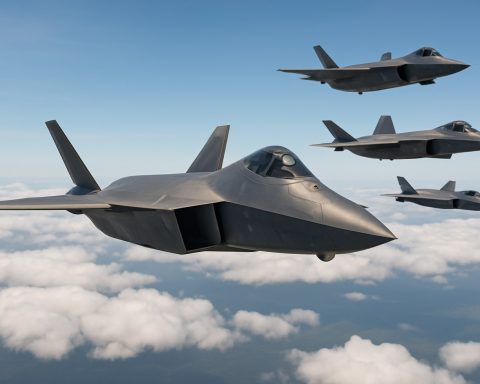- Two rockets were launched from Lebanon into northern Israel, with one intercepted and the other landing harmlessly in Lebanon.
- The Israeli Defense Forces retaliated by targeting alleged Hezbollah sites, including a command center and launch locations in southern Lebanon.
- No group has claimed responsibility for the initial attack, leaving political motivations uncertain.
- Israel’s response emphasizes its commitment to protecting its citizens and maintaining border stability.
- The incident highlights ongoing tension and the delicate balance required to prevent escalation along the northern frontier.
- Residents are reminded of potential dangers, underscoring the importance of vigilance, diplomacy, and decisive actions for lasting peace.
As dawn began to break over the serene landscape of northern Israel, the tranquility was abruptly shattered. Sirens wailed, slicing through the morning calm as residents of Margaliot, Misgav Am, Kiryat Shmona, and Tel Hai awoke to a foreboding sound of imminent danger. The cause? Two rockets launched from across the Lebanese border. One was skillfully intercepted, spiraling into fragments high above, while its companion misfired harmlessly into open Lebanese fields. Yet, the air hummed with tension, a palpable reminder of a fragile peace dangling by a thread.
The Israeli Defense Forces swiftly pinpointed and retaliated against alleged Hezbollah positions, striking with precision at a command center and numerous launch sites in southern Lebanon. This calculated response was not merely an act of defense; it served as a stern reminder of Israel’s resolve to safeguard its citizens and maintain the tenuous calm along its border.
Responsibility for the initial rocket fire remains cloaked in ambiguity. No group has stepped forward to shoulder the blame, leaving analysts to speculate about the intricate web of motives and alliances that shape such confrontations. Yet, the political message from Israel was crystal clear: The specter of past escalations will not be allowed to reemerge unchecked. The Lebanese government, seen as holding the reins of influence over these militant incursions, has been warned of its pivotal role in controlling such aggressive acts.
This episode underscores a poignant truth about the volatile dance along Israel’s northern frontier—an uneasy balance poised on the edge of escalation, where a moment’s notice can tip the scales. In the cool corridors of power, decisions pulsate with immediacy, aiming to stymie the chaos before it unfurls across the Galilean landscape.
For the residents of Galilee, such warnings are a stark reminder of the potential perils that crouch at the edge of daily life. And while this episode ends with no loss of life, it underscores an urgent need: the pursuit of enduring peace and the avoidance of a replay of past conflicts. The takeaway echoes loudly; vigilance, diplomacy, and decisive action must converge to maintain the delicate peace of today and secure the promise of a more stable tomorrow.
Rising Tensions: The Quiet Storm on Israel’s Northern Border
Background and Current State of Affairs
The recent rocket attacks on northern Israel highlight the fragile peace along the Israel-Lebanon border, where tensions between Israel and Hezbollah simmer beneath a deceptive calm. Historically, this border has been a flashpoint, often escalating into larger conflicts like the 2006 Lebanon War. The latest incidents exemplify the tit-for-tat exchanges that have the potential to spiral out of control without careful management.
Key Questions and Insights
What Motivates These Conflicts?
Despite the ambiguity surrounding the responsibility for the attacks, it’s critical to understand the broader geopolitical dynamics at play. Hezbollah, with backing from Iran, seeks to bolster its influence in the region, while Israel remains committed to thwarting threats to its security. The Lebanese government is caught between these forces, struggling to exert authority over armed groups within its borders.
How Does This Affect Daily Life in Northern Israel?
For residents of areas like Margaliot and Kiryat Shmona, these skirmishes disrupt daily routines and instil a sense of uncertainty. Frequent drills and siren alerts are a part of life, keeping communities on high alert and creating psychological stress amid the pervasive threat of escalation.
The Role of International Diplomacy
International diplomacy plays an essential role in de-escalation. The United Nations Interim Force in Lebanon (UNIFIL) operates in the region, aiming to mitigate conflicts and ensure a ceasefire. However, more robust and coordinated international efforts are needed to address root causes and foster long-term stability.
Tactical and Strategic Responses
How Israel Reacts to Threats
The Israeli Defense Forces (IDF) responded to the rocket fire with targeted strikes. This strategy serves dual purposes: immediate defense and a deterrent against future attacks. Such actions, while defensive, must balance military necessity with the risk of broader conflict.
Potential for Broader Conflict
The cyclical nature of these skirmishes risks escalating into broader conflict. It’s crucial for both Israeli and Lebanese authorities, along with international mediators, to actively engage in dialogue aimed at preventing further escalations.
Real-World Use Cases and Market Forecasts
Security Technologies and Systems
The ongoing tension showcases the need for advanced security technologies. Israel’s Iron Dome system is a prime example, intercepting rockets with high precision and reducing potential casualties. The global demand for such defensive systems is expected to rise in volatile regions, prompting significant growth in the security tech sector.
Economic Implications
Border conflicts can affect local economies by disrupting trade and tourism. A stable security situation is vital for economic growth as it fosters investor confidence and encourages cross-border commerce.
Pros and Cons Overview
Pros:
– Advanced interception systems like the Iron Dome protect lives and reduce casualties.
– International diplomatic efforts can lead to long-term peace processes.
Cons:
– The ongoing threat of conflict heavily impacts civilian life and economic stability.
– Military responses, while necessary, may lead to unintended escalations.
Actionable Recommendations
1. Stay Informed: Residents should regularly update emergency plans and participate in drills to stay prepared.
2. Engage in Peacebuilding: Support local and international organizations focusing on conflict resolution and peacebuilding initiatives.
3. Invest in Home Security: Consider investing in home security systems equipped with alerts for real-time safety updates.
For more in-depth analysis and updates on regional security, visit the United Nations and Global Security resources, which offer extensive information on global security dynamics and peacekeeping efforts.







